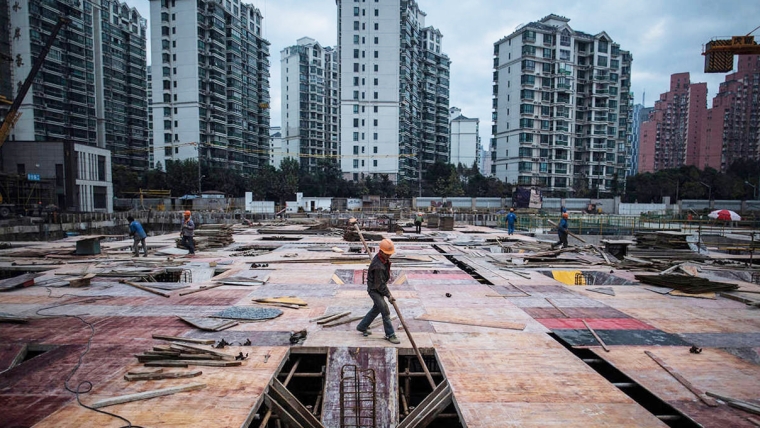
Economist Min Zhu, speaking at a World Economic Forum panel in China in late June, was among the first to hint at China’s underwhelming post-COVID policy stimulus. Zhu, a former deputy managing director of the International Monetary Fund, as well as a former deputy governor of the People’s Bank of China (PBOC), is no casual observer of the Chinese economy and its role in the world. He is also one of my oldest and wisest friends in China, and I have learned to take his views very seriously.
Zhu’s prediction has proven to be accurate. Despite a promising snapback after the abrupt zero-COVID exit, China’s economic rebound has faltered in recent months. Many had hoped that the government would respond to this shortfall and introduce another large-scale stimulus package, as is its usual practice. Yet a series of announcements in mid-August from the PBOC, the China Securities Regulatory Commission (CSRC), and the State Council has dashed those hopes.
The PBOC guided short-term lending rates only marginally lower, while the CSRC focused on enhancing market mechanisms, including longer trading sessions, reduced brokerage fees, and support for stock buybacks. The State Council, for its part, scrambled to slow the carnage in the property sector, as Country Garden faces liquidity pressures and Evergrande filed for bankruptcy protection in the United States.
For a country that has long prided itself on implementing proactive policies to preempt economic pressures, the latest stimulus measures are surprisingly reactive. The question is why. Zhu, in his remarks during the WEF panel, pointed to China’s debt problem.
By now, of course, the broad dimensions of China’s debt problem are well known. According to the Bank for International Settlements (BIS), non-financial debt stood at 297% of GDP at the end of 2022. That is more than double the ratio at the onset of the global financial crisis in late 2008, when it was 139%, and up more than 100 percentage points since late 2012, when Xi Jinping became General Secretary of the Communist Party of China (CPC).
Zhu’s argument is straightforward: an over-leveraged Chinese economy cannot afford another round of debt-financed stimulus. Chinese policymakers have been attuned to the risks of a debt build-up since 2016, when the now-infamous “authoritative person” publicly warned that China faced potential Japanisation.
But understanding a lesson is different from acting on it. While China clearly needs to wean itself off debt-fueled growth, it is less clear why that hasn’t happened yet.
The answer lies in the mix of the Chinese debt cycle. Over the first decade of Xi’s leadership, BIS data reveal that growth in corporate debt accounted for 47% of the total increase in China’s indebtedness, the share of government debt was 30%, and household debt made up the remaining 23%.
Researchers at the International Monetary Fund have identified two main reasons for this debt surge: increased leverage of debt-intensive, low-return state-owned enterprises (SOEs), and a higher concentration of public indebtedness in local-government financing vehicles. The former is a byproduct of the unmistakable shift in economic power from the private sector back to the state sector under Xi’s leadership. The latter is an outgrowth of runaway land sales and property development, which have now hit a wall.
That gets to the essence of Zhu’s point about Chinese stimulus: enough is enough. By opting for surprisingly small measures, CPC leadership is drawing a line in the sand. Although the Chinese authorities would never openly admit to poor stewardship of the economy, increasingly worrisome debt dynamics in SOEs, combined with the possibility of a full-blown property-market crisis, have left them with no choice but to shift away from the current unsustainable growth model.
Their decision has important implications for China’s economic future. Absent support from the property sector, which accounts for roughly 25-30% of GDP, a Japan-like sustained shortfall of economic growth is a distinct possibility.
Mindful of this, the Chinese government has made yet another push for consumer-led rebalancing, with a 20-point plan released in late July. This should be music to my ears, given that I have written two books on the topic and for years have taught a course about it at Yale. But a careful look at the plan leaves me cold.
Specifically, the new consumer plan makes no mention of strengthening the social safety net – especially health care and pensions – for a rapidly aging population. Yet, unless this urgent challenge is addressed, Chinese families will continue to opt for fear-driven precautionary saving over discretionary consumption.
Barring a successful consumer-led rebalancing, it will be exceedingly difficult for China to recapture its previous growth momentum. Since the 2008 global financial crisis, the economy has grown about 7%, on average, accounting for nearly 35% of the cumulative increase in world GDP during the same period. If China’s growth rate slows to 3-4% – a distinct possibility – its contribution to global growth will be halved, with obvious knock-on effects for the rest of the world.
While the media focused on Zhu’s prediction that the Chinese government would not roll out a massive stimulus, his main point at the WEF panel was that a growth shortfall would necessitate structural reforms – an argument that I have also made over the years. Yet the benefits of such reforms, if they do occur, are likely to be realised only in the long term, while the headwinds of China’s current shortfall are blowing fiercely in the here and now. As China’s most powerful leader since Mao, the increasingly powerful, security-focused Xi seems willing to accept this tradeoff for the time being.
*Stephen S. Roach, a former chairman of Morgan Stanley Asia, is a faculty member at Yale University and the author of the forthcoming Accidental Conflict: America, China, and the Clash of False Narratives (Yale University Press, November 2022). Copyright: Project Syndicate, 2023, published here with permission.
6 Comments
Mr Xi is the best thing that's happened to China for a generation or more - best if you prefer your North Asian neighbours in debt & perhaps even a little humbled. Power requires money, & if you can't earn it, print it. And if you can't make that pay off, then the CCP will gladly swallow you up hook, line & sinker. Sadly, socialism rarely works out for the best & communism is even worse. This may not end well.
Back down on main street the average person can see what's going on, even when the authorities are telling you something different. These hard working folk know a con when they see it. After all, China invented the con. And their confidence in their own system is lagging. Badly. Keep your money close & your investments closer. In other words, ''No more real estate this year my dear.''
Unfortunately that will have effects down under. Iron ore, coal, milk & other proteins have been Chinese import staples for 20 years or more. That is all about to change. The good news is that 1.4(?) billion people still need to eat. The bad news is it could be back to rice & veges.
You must be very old. Communism hasn't been around for a very, very long time. Nor has true socialism.
There are two forms of dog-eat-dog; neoliberal dog-eat-dog (what we have) and authoritarian dog-eat-dog (what they have).
Both are unmainainable, both are dissipative, both tend towards entropy.
Don't blame the 'other' system; blame the system.
All money is created as debt and is somebody's liability. Repay debt and the money disappears again. Only governments can create money which is free of debt for the private sector but it is also their own liability and so government debt and private debt should never be added up together as they are totally different things. Government debt is the private sectors 'net financial assets' or savings in the domestic currency. (Sectoral Balances).
The yuan is already under pressure. They can’t afford to return to the default ‘lower rates’ response of the last 20 years, at least not until the US has lowered rates. They’d face massive capital outflows and uncontrollable bleeding of foreign currency reserves from the PBOC.
...land sales...
China leases land. It's better to think of housing in China as a durable consumable.
...new consumer plan makes no mention of strengthening the social safety net – especially health care and pensions – for a rapidly aging population.
Why would the Chinese government want to voluntarily inherit unfunded liabilities? Pensions and care are increasingly a blight on countries with better balanced demographic profiles and higher incomes.
$60 Trillion Financial System on the Brink as This Entire Sector Comes Unraveled

We welcome your comments below. If you are not already registered, please register to comment
Remember we welcome robust, respectful and insightful debate. We don't welcome abusive or defamatory comments and will de-register those repeatedly making such comments. Our current comment policy is here.